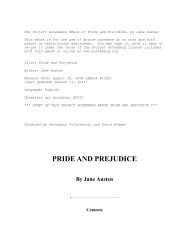pride
Create successful ePaper yourself
Turn your PDF publications into a flip-book with our unique Google optimized e-Paper software.
consoled her for her melancholy conviction of her husband's never intending to go there<br />
himself.<br />
But they were entirely ignorant of what had passed; and their raptures continued, with<br />
little intermission, to the very day of Lydia's leaving home.<br />
Elizabeth was now to see Mr. Wickham for the last time. Having been frequently in<br />
company with him since her return, agitation was pretty well over; the agitations of formal<br />
partiality entirely so. She had even learnt to detect, in the very gentleness which had first<br />
delighted her, an affectation and a sameness to disgust and weary. In his present behaviour<br />
to herself, moreover, she had a fresh source of displeasure, for the inclination he soon<br />
testified of renewing those intentions which had marked the early part of their acquaintance<br />
could only serve, after what had since passed, to provoke her. She lost all concern for him<br />
in finding herself thus selected as the object of such idle and frivolous gallantry; and while<br />
she steadily repressed it, could not but feel the reproof contained in his believing, that<br />
however long, and for whatever cause, his attentions had been withdrawn, her vanity would<br />
be gratified, and her preference secured at any time by their renewal.<br />
On the very last day of the regiment's remaining at Meryton, he dined, with other of the<br />
officers, at Longbourn; and so little was Elizabeth disposed to part from him in good<br />
humour, that on his making some inquiry as to the manner in which her time had passed at<br />
Hunsford, she mentioned Colonel Fitzwilliam's and Mr. Darcy's having both spent three<br />
weeks at Rosings, and asked him, if he was acquainted with the former.<br />
He looked surprised, displeased, alarmed; but with a moment's recollection and a<br />
returning smile, replied, that he had formerly seen him often; and, after observing that he<br />
was a very gentlemanlike man, asked her how she had liked him. Her answer was warmly<br />
in his favour. With an air of indifference he soon afterwards added:<br />
"How long did you say he was at Rosings?"<br />
"Nearly three weeks."<br />
"And you saw him frequently?"<br />
"Yes, almost every day."<br />
"His manners are very different from his cousin's."<br />
"Yes, very different. But I think Mr. Darcy improves upon acquaintance."<br />
"Indeed!" cried Mr. Wickham with a look which did not escape her. "And pray, may I<br />
ask?—" But checking himself, he added, in a gayer tone, "Is it in address that he improves?<br />
Has he deigned to add aught of civility to his ordinary style?—for I dare not hope," he<br />
continued in a lower and more serious tone, "that he is improved in essentials."<br />
"Oh, no!" said Elizabeth. "In essentials, I believe, he is very much what he ever was."<br />
While she spoke, Wickham looked as if scarcely knowing whether to rejoice over her<br />
words, or to distrust their meaning. There was a something in her countenance which made<br />
him listen with an apprehensive and anxious attention, while she added:



